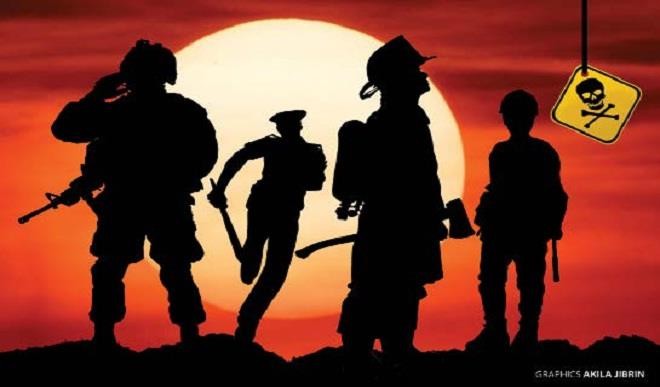How we stay safe, by people with dangerous jobs
It goes without saying that some jobs are more dangerous than others, with the immediately obvious being those in the military and security sectors. Construction workers, too, are globally seen as having extremely hazardous professions, with many having lost their lives in the course of work. Ironically, a job as simple-sounding as that of a […]


It goes without saying that some jobs are more dangerous than others, with the immediately obvious being those in the military and security sectors. Construction workers, too, are globally seen as having extremely hazardous professions, with many having lost their lives in the course of work. Ironically, a job as simple-sounding as that of a street-sweeper is fraught with danger, as reports abound of an unfortunate one or the other crushed by speeding cars. It’s clear however, that for any person with a dangerous job to remain in one piece, a personal, individual approach to keeping safe needs to be in place.
Soldier X (not real name) said he knew very well the potential danger in his chosen profession, even when he enlisted in the Nigerian Army. “I joined at the peak of Boko Haram insurgency some years ago and I wasn’t fazed when I was posted to Borno State.” The 23-year-old revealed that he keeps himself safe by simply sticking to rules of the profession and not doing too many improvisations. “Also, I take orders very seriously and I take pride in my personal discipline,” he said, adding that while improvisations are sometimes required in the unconventional theatre that is the North-East, he stays safe by “doing the right thing at all times”. Prayer, the young soldier added, also goes a long way in keeping one safe in war-torn areas.
There are a number of things that could make a job dangerous, particularly if it can lead to death. Mustapha Aliyu is a seasoned hunter who has ventured into thick forests in Zaria for the sole purpose of making a kill. He has done this for years and believes there’s only one ultimate way to stay safe. “I use charms that make me remain invisible to wild animals, and then when I get close, I strike,” he says. He explains that hunting is done in different ways, some of which involve setting fire to draw out game and using a gun or letting loose dogs on them. He also explains that some animals can only be hunted under the cover of darkness. “It’s dangerous because we encounter lions too and other wild, dangerous animals,” he says, adding that the amulets he uses are strictly for wildlife.
While a hunter’s foes are wild beasts, a construction workers’ contention may be the scaffold or crane where any slight mistake may lead to serious injury or even death. Jonathan David points out that this is where protective gear, such as safety boots, helmets and a reflection jacket help to prevent such tragedy. The boots are meant to protect the worker from sharp and lethal objects sometimes left lying about or stuck on wood, such as iron benders; the helmet, in the event an object falls; hand gloves to protect from contact with cement and other substances. He further reveals that the crane which lifts heavy materials is properly mounted and supported just so it does not fall.
In every emergency-prone environment, medical assistance is indispensable. Elechi Collins who works for the Federal Fire Service explains that availability of a functional clinic is important aside the protective gear needed to cushion the effect of fire when on duty, which includes a robe and tools used to break into buildings. “The gear helps because there could be a building collapse,” he says, adding that a colleague recently remained unconscious for two days.
Corporal Ahmadu (not real name) says while his job as a law enforcement officer is dangerous, especially since he works in a big city like Port Harcourt where violent crimes are rampant. “I stay safe, basically, by applying common-sense. If an area is dubious, I don’t just jump in gung-ho. It pays to be careful, as criminals are ever-creative in finding ways to avoid apprehension,” he says. “I also take training seriously, and I always practive my shooting at the range when I can, as one clean shot can mean you escape death while a sloppy one means goodbye.”
A relevant question may be whether it’s worth it or not to put ones’ life in danger to earn a living or even for love of a job. However, precautions seem to be a key area such people tend to invest in. Nigerian roads have been said to be one of the most dangerous in the world, yet commuting is not an option and people still drive, particularly commercial drivers who are more at risk. The list of dangerous jobs is long: There are petrol tanker drivers – and everyone probably knows what a petrol explosion can be like – electricians, telecoms mast engineers, labourers who excavate sand from rivers, miners and so on.
